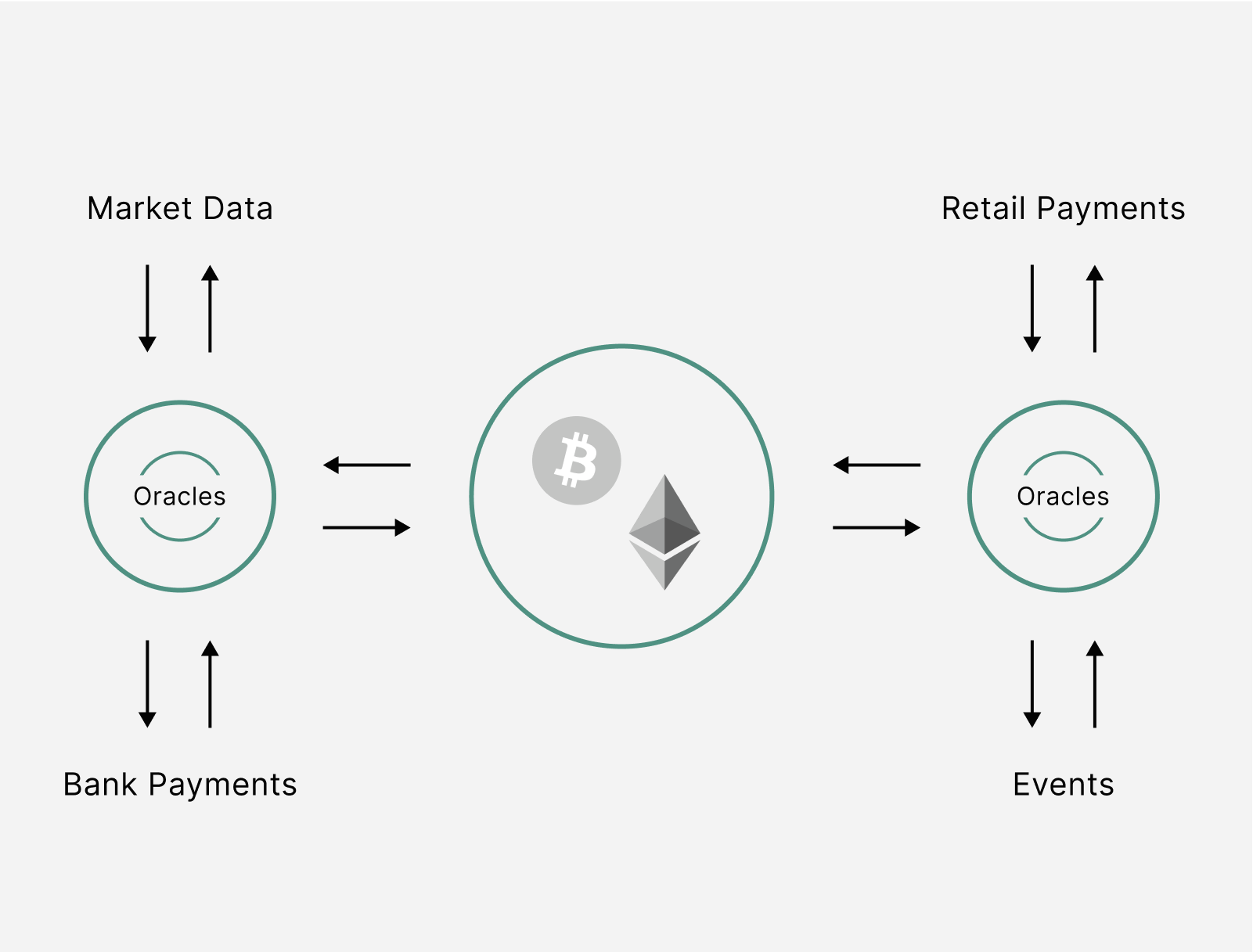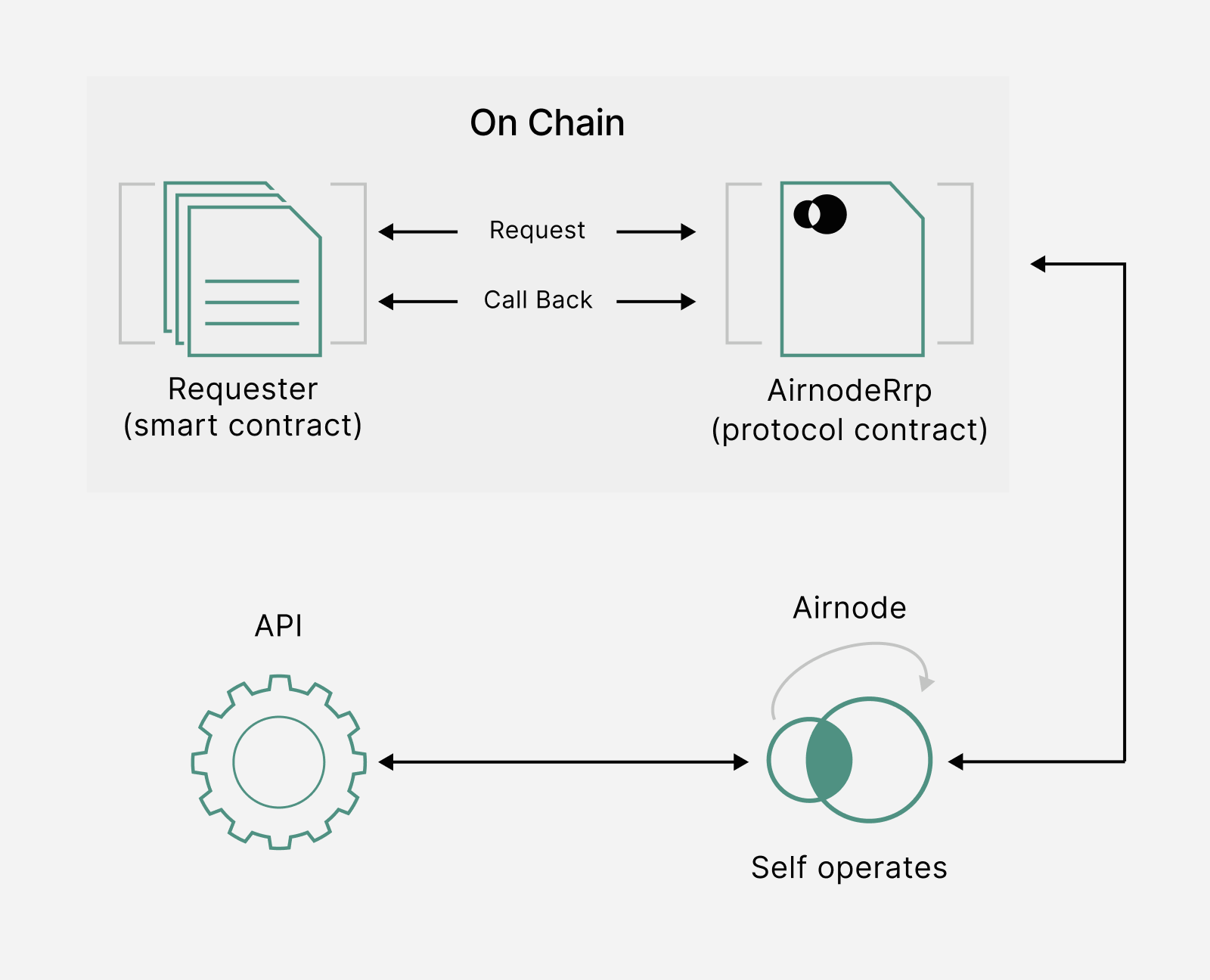 Explore → Airnode
Explore → AirnodeWhat is Airnode?
At its core, Airnode lets API providers easily run their own oracle nodes. Airnode allows providers to publish data feeds (dAPIs) to any on-chain decentralized app (dApp) that's interested in their services, all without an intermediary.
Airnode lets dApp developers write smart contracts that interact with off-chain data of API providers at ease. It's designed to be easily deployed by any API provider with almost no maintenance.
The API Connectivity Problem
Smart contracts operating on a blockchain are limited in their access to off-chain data. This phenomenon is referred to as the Oracle Problem. All the game theoretic and cryptographic methods proposed for various oracle solutions essentially aim to provide smart contracts access to paid APIs.
As such it would be more accurate to define the problem at hand as the API connectivity problem. Solving the API connectivity problem has been a key consideration in the design of API3's offerings.

As you read more about API3, you will discover that this redefinition will have ripple effects across the entire solution, from how the ecosystem is built to the lowest levels of the protocol.
Additionally, existing oracle solutions fall short because they fail to make this distinction, resulting in inferior solutions that depend on third-party oracles and ecosystems that exclude API providers. As such, API3 believes the oracle problem is ill-posed, instead we are faced with an API Connectivity Problem.
Learn more
Read about Airnode in the API3 Whitepaper: A Node Designed for First-Party Oracles.
Key features
Airnode is a fully-serverless oracle node that is designed specifically for API providers to operate their own oracles. Airnode has been designed to be a lightweight wrapper around a Web API that allows it to communicate with smart contract platforms, with no overhead or payment token friction.
It addresses many of the issues API providers face in relation to oracle nodes:
1. Set and forget
Airnode does not require any specific know-how to operate. In fact, it is difficult to even speak of any operation as Airnode is designed around the "set and forget" principle. Airnode's stateless, serverless technology eliminates the need for day-to-day maintenance and monitoring, and provides superior resilience against permanent downtime or operator interventions.
2. Ease of deployment
Oracle tooling has been developed to make Airnode simple and easy to deploy. A basic understanding of API operation is all that is needed with the process taking no longer than 30mins (should the appropriate preparation be in place).
3. Efficient and flexible operation
It is built on services priced on-demand, meaning that the node operators are charged only by the usage of their node. This allows API providers to run an oracle for free and start paying only after they start generating revenue. For smart contracts this makes accessing real world data economical, when considering the gas fees for oracle transactions.
4. Equitable API Provider incentives
Airnodes protocol is designed in a way that the requester covers all gas costs for oracle transactions. Operating Airnode does not require the node operators to handle cryptocurrency. Authentication happens through tooling within the API3 ecosystem.
Learn more
A high-level overview of Airnode can be found in the dedicated Medium article published by API3.
Connecting APIs to the blockchain
When it comes to integrating APIs to oracles, we face a chicken-and-egg problem. If there is no existing demand for an API in an oracle ecosystem, nobody has the incentive to integrate it. If the API is not available because it's missing an integration, nobody is going to develop applications that could create the demand.
Airnode facilitates a simplified connection between APIs and blockchains, enabling smart contract engineers to gain access to data for use in dApps as soon as they identify a need for the API Providers’ services. Consequently, Airnode helps to eliminate any restrictions when it comes to application development allowing developers to quickly leverage additional resources.

For smart contracts engineers this means access to real world data as needed within the development lifecycle. This translates to a host of meaningful use cases being realized for two key reasons:
- Increased data availability through the correct incentivization of API Providers
- The flexibility of being able to utilize Airnode to connect smart contracts to APIs
Oracle Integration Standards (OIS)
To reach its full potential, API3 will need hundreds, if not thousands, of first party oracles, so that it can easily set up new decentralized APIs (dAPIs) or recompose existing ones. This can only be achieved if APIs can be integrated to Airnode in an even more scalable way. To this end proprietary integration tools will be open sourced for Airnode.
Borrowing from the OpenAPI Specification format, Oracle Integration Specifications (OIS) defines the operations of an API, the endpoints of an oracle, and a way of mapping them to each other. Airnode users will be able to serve an API over their oracle simply by providing its OIS to their node. Integrations made in this standardized format will be very easy to collect, version and distribute.
How does Airnode work?
Airnode is has made it easy for API Providers to monetize their data to decentralized applications (dApps). To understand how Airnode serves data on-chain, read more about how Airnode works.
FLEX_END_TAG

